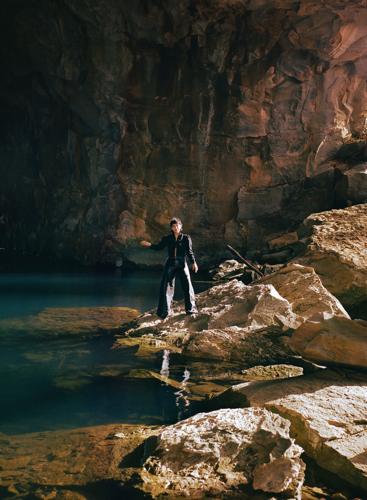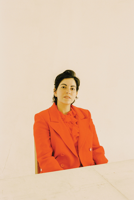
Becca Mancari
Becca Mancari isn’t afraid anymore.
Their new album Left Hand, out Friday via Captured Tracks, grapples with heartbreak, death, depression and trauma. But the songs are not stuck in those moments, as Mancari moves through the difficult emotions with the ease found only through experience, like a tree with roots widespread to withstand any storm. On Left Hand, Mancari invites the listener to sit with them without trying to immediately force a specific narrative. For Mancari, this kind of vulnerability separates this record from their previous LP, 2020’s The Greatest Part.
“I allowed there to be space on this record,” says Mancari. “Even if you look at the timestamps of the songs — on The Greatest Part, there’s a lot of two, two-point-something [minutes]. And I think there is a lot of me that was afraid to let people sit in with me. And I think I was fighting back, in a way of, ‘Accept me, love me, see me.’ … That is an attribute of fighting back, right? Like, when you’re wanting to fit in or be part of something. And I always felt like I was on the outside. I think similarly to how I was raised — like, I was never a cool guy.”
Many of the record’s tracks speak to Mancari’s childhood, a deeply religious and fraught one, culminating in their leaving home disowned at 16. But Left Hand, named for an image in Mancari’s Italian family crest, isn’t an angry record. Songs like “Homesick Honeybee” and “It’s Too Late” deal with a complication that many face: figuring out how to sever ties with harmful ideologies while maintaining a bond with loved ones who hold them. It’s a hard and painful process, one that Mancari says is crucial for growth.
“I don’t know the answer fully, but I do know that: It can get better,” they say. “And I know that, like, for me — I keep doubling down on this — it is a journey of self-love and self-acceptance. That is something that has to happen in our lives. Because I think, unfortunately, a lot of our parents, like, they weren’t allowed to experience that.”
It would’ve been easy for Left Hand to be a very different record. Beyond parsing Mancari’s family trauma, there was a session with a big-name producer that fell apart when they showed Mancari the kind of disrespect so many women and queer artists face. It would have made sense for them to respond by writing a record fired up with rage. But Left Hand shows a maturity far beyond that, beginning in a place of anger but blossoming into healing and acceptance.
“We all have choices, that’s true, but there’s agency and acknowledgment, and you have to have some accountability for that,” Mancari says. “But I think for me, like, I’ve been angry. ‘It’s Too Late’ is an angry song, by the way. That’s the song that started me, though, being free to write all the other ones. That was the cornerstone — that was, like, ‘It’s OK, I’m as angry as I’ll be.’ I’m saying: ‘You almost killed me. Do you not understand? … Like, queer people are killing themselves, kids are killing themselves. Don’t you understand what you do matters?’”

Becca Mancari
Mancari’s story as told through Left Hand has deep Nashville ties. From a lyrical reference to fistfighting at The 5 Spot in “Over and Over” to a trio of local chosen-family collaborators — Julien Baker, Brittany Howard and Zac Farro — the experiences and connections Mancari has made in Nashville are an essential part of both their healing and their art.
“I came up by myself here — I came up, like, with no support,” they say. “I did not have any parents’ support. I was not a kid that went to Belmont. I was not a kid that had, like, a trust fund. No offense to those kids, they’re great. But I came here with two bags and a guitar. And I had never visited before. I just got in my car one day and said, ‘I’m gonna go to the hardest place to become a songwriter and learn from the best.’”
Mancari has come a long way since those early days, from working at Mas Tacos to releasing a queer Americana record, 2017’s Good Woman, before it was widely accepted in the South. Their journey to success and acceptance, though not easy, has helped create a culture of love and healing around them, one that exudes light throughout Left Hand. If The Greatest Part was Mancari fighting back, Left Hand is the sound of them realizing they don’t have to. And those who listen and find it resonates with them don’t have to, either. For both Mancari and their audience, the story is just beginning.
“I really want people to know, like, this record is me. This is Becca — this is just the cusp. I think it’s just gonna get better from here.”









